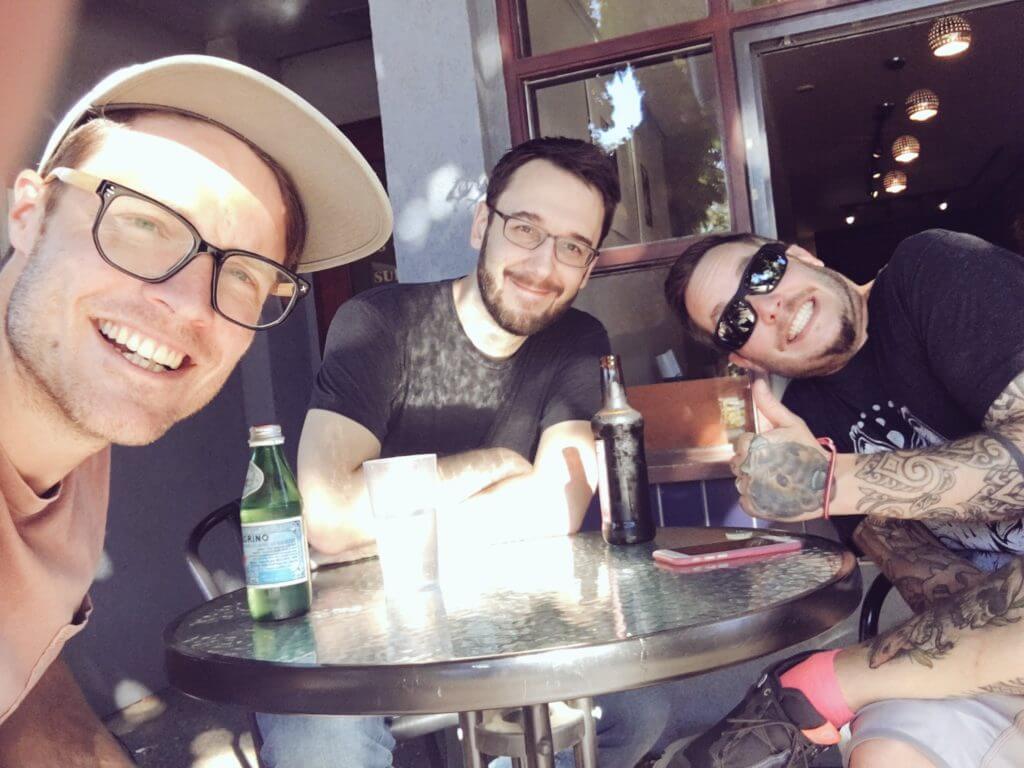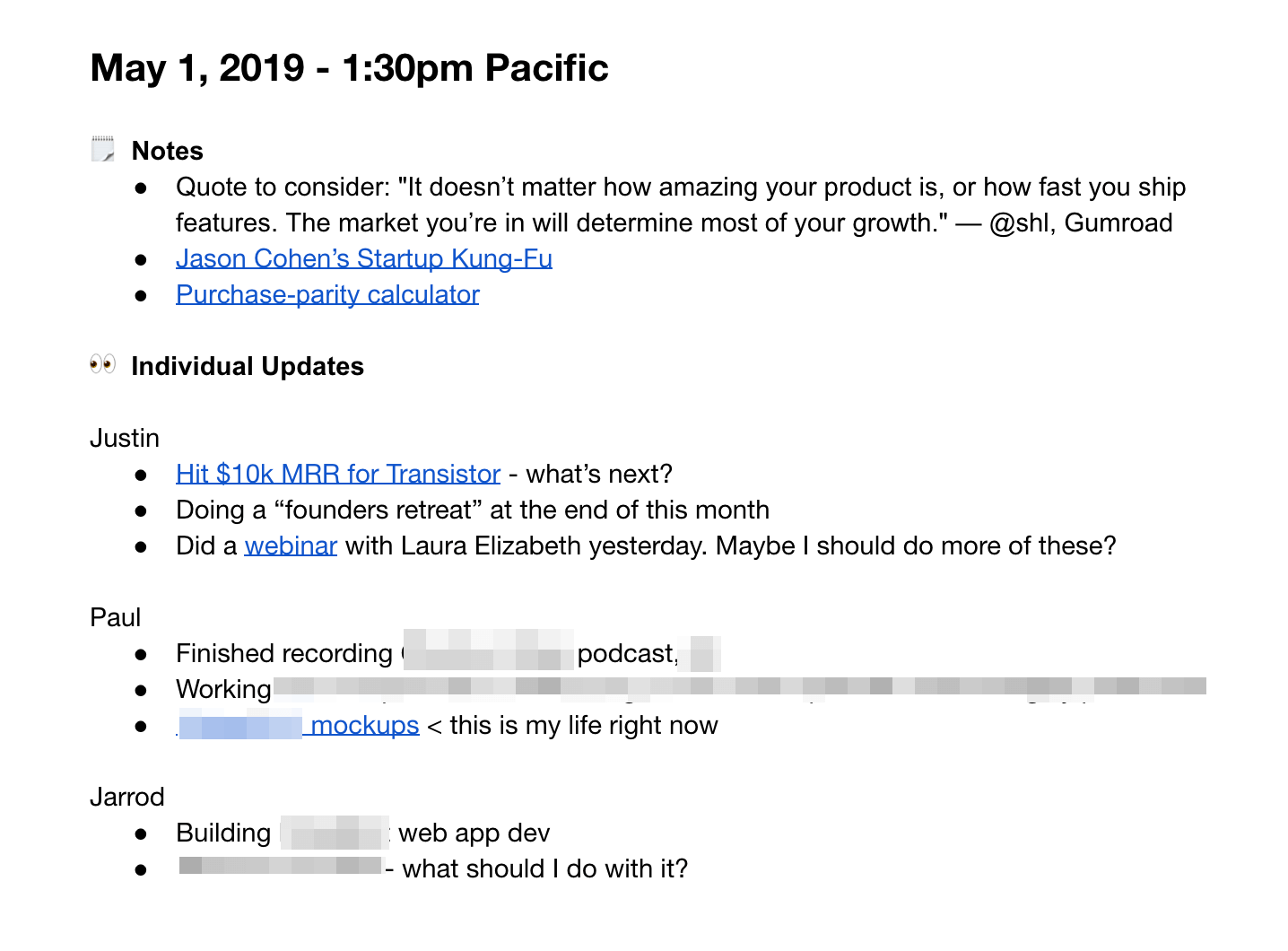How to run a mastermind group
In the summer of 2014, I sent Paul Jarvis and Jarrod Drysdale an email, asking if they wanted to start a mastermind group together.
Shortly after, we started meeting for weekly Google Hangouts. We've done these meetings consistently since then (the only change is that we now meet monthly instead of weekly).
I was recently asked by Bryan Dubno about how a mastermind works:
I’m thinking about getting a small mastermind group together where we could all get together every week. I haven’t been part of one before, so I’m not entirely sure what the format should be. Does anyone have any experience putting something like this together? Are there any useful resources out there?
Here's a quick description of how we started our mastermind, and how we run it week to week.
What is a mastermind group?
Wikipedia's definition is pretty good:
A mastermind group is a peer-to-peer mentoring concept used to help members solve their problems with input and advice from the other group members.
If you're an entrepreneur, you probably want to start a business mastermind group. My definition of what I've seen most bootstrapped founders run is something like this:
How we met and started our mastermind
In my case, I reached out to Paul Jarvis and Jarrod Drysdale. I'd met them both on the internet, and they'd both been on my podcast.
I thought we would be a good fit because, in 2014, we were all going through transitions:
- Paul was becoming known as a writer but was still doing freelance design work. He was working on his first course (The Creative Class) and wanted to move into product development.
- Jarrod had released a book called Bootstrapping Design that had done really well and was looking to build his next product.
- I was doing contract work for a startup in Portland and had just released a little ebook. I was working on Marketing for Developers on the side (but hadn't launched it yet).
We did our initial call, and we all agreed that we had good chemistry.
How to find your mastermind members
Finding a group is tricky. For a mastermind to work, members need to align in the following areas:
- What they want to get out of the group.
- How committed they're going to be to the group.
- How much rapport (and trust) the members have already built with each other.
- Members should also be at roughly "the same place" in their business journey.
- Logistics: it really helps if you're all in a compatible timezone (in our case it's MST + PST).
There are services like Mastermind Jam that will match you, but I've never used them.
I think the most effective technique is to get out and meet people. This way, you'll have a variety of folks you could invite to join you in a mastermind.
Here are some places I've made meaningful connections:
- Slack groups and forums: I've built incredible relationships on MegaMaker and (the now defunct) Startup Edition.
- Twitter: I still can't believe how many great people I've met through Twitter. If you use it right, it can be a great place to find folks with similar interests.
- Meetups and conferences: I met my business partner, Jon Buda, at XOXO Festival in Portland. Whenever I'm visiting a city, I'll often look at Meetup and attend a local event.
- This blog: a big reason Paul, Jarrod, and I decided to get together is we'd all read each other's blogs. If your blog is resonating with folks, you'll build relationships.
How to run a mastermind group
Initially, we ran our mastermind meeting weekly. We scheduled it as a recurring event in Google Calendar (every Thursday, at 3pm Pacific). Nowadays, we don't feel the need to meet every week, so we do it monthly.
However, the format has always stayed the same. Our agenda will look something like this:
There are three different sections:
- Notes: this is where we'll put interesting new items, links, and quotes to discuss.
- Personal updates: this is where we'll list out the personal updates we'd like to share (we pre-populate this before we meet). Sometimes these are items we want feedback on, but sometimes it's just personal news we want to share. Each person gets 15 minutes.
- Big discussion topic: occasionally, we'll skip the personal updates, and just choose a bigger question to discuss. Example: "What do you think are the main causes of your successes so far?"
We'll record all of our notes in a Google Doc. (This is important, see below)
What are the benefits of a mastermind group?
Now that we've been doing this for 5+ years, we've seen how the mastermind has positively impacted our lives.
The mastermind has given us a safe place to discuss the hard parts of life and business. It's enabled us to share information and to support each other. Its provided accountability, and motivated each of us to press on.
Because we write notes for every meeting, we have this amazing record of our individual journeys, from 2014 until now. That Google Doc has given us insight into:
- How far we've come.
- All of our ups and downs.
- All of the things we've tried.
- What's worked, what hasn't, and what's still working.
It's an incredible document. It shows the power of people coming together, with intention, to help each other.
If you're building a business, even if you're a solo founder, you can't do this alone. A mastermind can provide you with the community you'll need to go the distance.
Cheers,
Justin Jackson
@mijustin


